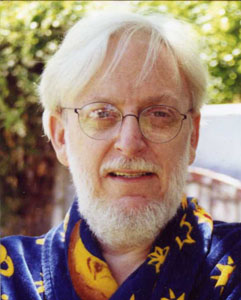| |
Done
Deal Interview w/Dan O'Bannon
 |
Screenwriter
& Director
AKA "The Billion Dollar Man"
Over ONE BILLION DOLLARS
in boxoffice world wide from
Dan's films!
CONTACT:
Gallagher Literary Management
|
|
Dan OíBannon has been a screenwriter
of note since 1979, when his film ALIEN stunned international
audiences with its creativity, vision and sheer story-telling
genius. His film career continued with well known films such
as BLUE THUNDER, TOTAL RECALL, RETURN OF THE LIVING DEAD,
and DARK STAR. His career total box office receipts in first-run
theatrical domestic release amount to over one billion dollars.
Less well known is his deep interest in, and study of physics,
history and arcana which inform and add richness to his work.
He is currently completing a book, OíBANNONíS RULES OF WRITING:
The Definitive Guide to screenplay Structure. Another work,
based on The Necronomicon, has been several years in the writing
and is impatiently awaited by the cognoscenti.
WHEN WERE YOU FIRST INTERESTED IN FILMS?
THEN WRITING?
The first movie I recall seeing was THE THING FROM ANOTHER
WORLD when I was five years old. We lived in the Ozarks and
had no television back then, but we went to the movies two
or three times a week. There was one theatre, and a drive-in
outside of town. Movies were probably the single most important
influence of my childhood; I loved them and wanted to make
them, but I had no idea how one would go about getting to
be a filmmaker. Hollywood seemed as remote as the moon.
WHERE DID YOU GO TO COLLEGE AND/OR
DID YOU EVEN STUDY FILM/WRITING?
I did indeed attend film school, the USC Cinema Dept. back
in 1968-70, when it was a hotbed of ambitious young would-be
filmmakers including among others George Lucas, who was a
year ahead of me and therefore not of my tribe. But my first
college was Washington University in St. Louis, the School
of Fine Arts, where I studied to be the next Norman Rockwell.
I soon learned that the world only needed one Norman Rockwell,
so I decided to try for the movies.
TELL ME ABOUT WRITING YOUR FIRST SCRIPT?
WHAT WAS YOUR APPROACH LIKE?
Ponderous. It was called THE DEVIL IN MEXICO and was about
the disappearance of Ambrose Bierce into Mexico during the
Revolution of 1917. I thought I was writing a western but
now I know that my screenplay didnít address the classic themes
of westerns shoot-out on main street, etc. - I had in mind
it would be directed by David Lean. Orson Welles did see it,
liked it, and passed it around, but nothing came of it.
YOUR FIRST FEATURE FILM WAS "DARK
STAR" WHICH YOU WROTE WITH JOHN CARPENTER. HOW DID THIS
SCRIPT COME ABOUT? WHAT WAS THE WRITING PROCESS ON IT LIKE?
This was Johnís idea. It just grew out of hand. The two of
us would talk through the film, making lots of jokes, then
we would go off and independently write scenes. I gave Carpenter
what I wrote and he stitched it together.
HOW AND WHEN DID YOU GET YOUR FIRST
AGENT? WHAT WAS THAT LIKE FOR YOU?
I wasnít able to get an agent until after ALIEN opened. Iíve
had several agents and managers over the years, with both
good and bad handling. I am now with Rob Gallagher, who is
great for me. I signed with Rob because I liked his multiple
front attack attitude to the business and his personal involvement
with his clients. Because of Robís experience as an agent,
development executive and recently in distribution, he has
the inside knowledge and contacts necessary to handle a complex
career like mine, with its various co-writers and contractual
complications. Robís a real go-getter, and Iíve had meetings
all over town and many potential deals in the works since
signing with him. Iím also getting into game design thanks
to his Japanese connections, something Iíve wanted to do for
a long time.
YOU WROTE THE SCREENPLAY FOR ONE OF
THE ALL-TIME SCI-FI HORROR CLASSICS, "ALIEN." YOU
AND RONALD SHUSETT DEVELOPED THE STORY TOGETHER, THEN YOU
WROTE THE SCRIPT, YES? WHAT WAS IT LIKE DEVELOPING AND WRITING
THAT SCRIPT? WHAT RESEARCH DID YOU DO? WHAT DID RIDLEY SCOTT
BRING TO THE TABLE IN TERMS OF WRITING OR CHANGING THE SCRIPT
DURING DEVELOPMENT AND/OR PRODUCTION?
Ronnie helped with certain story elements and I did all the
actual writing. Ridley didnít come onto the project until
after the picture was at Fox, so he wasnít around during the
"spec writing" period, and didnít change the script
at all. I was lucky that Ridley was open to seeing the artwork
of H R Geiger, who I had met in Paris while working on DUNE
a few years before. I also showed Ridley TEXAS CHAINSAW MASSACRE
to show him "state of the art" horror. He brought
a lot of class to ALIEN.
FOR "BLUE THUNDER" YOU AND
DON JAKOBY SHARED WRITING CREDIT. WHAT WAS THE GENESIS OF
THIS PROJECT? WHAT WAS INVOLVED IN DEVELOPING IT? WHAT CHANGES
WERE MADE DURING THE PROCESS OF BRINGING IT TO THE SCREEN?
We had in mind "Taxi Driver in the Sky" - an LAPD
helicopter pilot goes nuts and shoots up LA. The producers
liked the action scenes and rewrote everything else. I plan
to offer the original screenplay to those interested in seeing
it whenever I get my website up and going, which is taking
a long time because of other commitments. The website is taking
a long time because I want to be on it very actively, and
communicate with those who enjoy my work. That needs a clear
stretch of time for me, something I donít have right now.
YOU WROTE AND DIRECTED THE HORROR CULT
CLASSIC "RETURN OF THE LIVING DEAD." RUDY RICCI,
JOHN RUSSO AND RUSSELL STREINER ALL RECEIVED STORY CREDIT
FOR THE FILM BUT YOU TOOK THE SOLE SCREENWRITING CREDIT. HOW
DID THIS PROJECT COME ABOUT? WHAT WAS THE STORY THEY BROUGHT
YOU? WHAT DID YOU CHANGE OR ADD? WHAT WAS IT LIKE TRYING TO
REINVENT THE ZOMBIE GENRE AS WELL AS PUT YOUR OWN STAMP ON
IT? WHAT WAS IT LIKE DIRECTING YOUR OWN MATERIAL?
Russo and co. had originated the project and I thought it
was only fair they should share writing credit. I had written
it for Tobe Hooper to direct, but he went off to do LIFEFORCE,
so I took over directing. I would have written it a bit differently
if I had known I was going to direct it.
YOU AND DON JAKOBY WROTE "LIFEFORCE."
IT WAS BASED ON A NOVEL BY COLIN WILSON. WHAT WAS ADAPTING
THE BOOK LIKE? HOW DID THIS PROJECT COME ABOUT AND EVOLVE?
WHAT WAS TOBE HOPPERíS INFLUENCE ON THE SCRIPT?
This was a Menahem Golan special. He bought the book and
hired Tobe to direct it and me to write it, and I brought
in Don to co-write with me. The novel wasnít structured like
a movie and I had to rebuild it. Tobe didnít try to have any
screenplay input, he just shot what was written.
(Iíll ASSUME AT THIS POINT THAT YOUR
RELATIONSHIP WITH HOPPERíS "LIFEFORCE" WAS GOOD
SINCE YOU AND DON WENT ON TO WRITE THE REMAKE FOR "INVADERS
FROM MARS.") WHAT WAS IT LIKE DOING A REMAKE OF A CLASSIC
SCI-FI FILM? WHAT WAS THE PROCESS OF UPDATING THE FILM? HOW
WAS THE EXPERIENCE OVERALL?
The pleasure of remaking a classic is the opportunity to
do fine detail work, to give a jeweled surface to a rough
diamond. However, difficulties during and after production
kept this from being the best it could be.
WITH "TOTAL RECALL" YOU WORKED
WITH RONALD SHUSETT AGAIN. WHAT WAS IT LIKE ADAPTING A SHORT
STORY THE SECOND TIME AROUND? WHAT ISSUES DID YOU FACE? HOW
DID THE STORY CHANGE? WHAT WAS YOUR PROCESS IN DECIDING WHAT
WAS ADDED TO FLESH OUT THE MATERIAL?
Phil Dick is tough to adapt. But I always made up my mind
that I wasnít going to throw out anything good, no matter
how difficult it was to keep it in. The ending of TOTAL RECALL
as seen on the screen is very different from the ending I
wrote. Naturally, I think my ending is better, and I hope
to offer my version of the screenplay to those interested
on my website, so they can judge for themselves.
WHAT ARE SOME OF THE THINGS THAT YOU
KNOW NOW THAT YOU WISH YOU KNEW WHEN YOU WERE FIRST STARTING
OUT? DOS AND DONíTS?
Ah, too many things to mention, and itís different for everyone.
Each writer has to find his own path, so what I needed to
learn isnít necessarily of any use to another writer.
WHATíS A TYPICAL WRITING DAY LIKE FOR
YOU? WHAT IS YOUR PROCESS?
I work in a room with no windows, usually late into the night,
so there are no distractions. I keep going until Iím too tired
to continue. I keep a notebook beside my bed for those times
I wake up with good ideas, which often come just as I fall
asleep. This continues until I finish, so many weeks are taken
up with the script my only consideration. My wife actually
manages to tolerate this.
DO YOU OUTLINE ALL YOUR SCRIPTS FIRST?
WRITE TREATMENTS?
I write twelve-page "Story Outlines" which I use
to structure the acts. As the screenplay is being written,
unexpected elements appear (AKA "good ideas") that
have to be reworked into the beginning of the story, so itís
constantly being revised from the beginning, even as it is
being written.
HOW DO YOU APPROACH REWRITES OF YOUR
OWN MATERIAL? ANY METHOD OR PATH THAT YOU TYPICALLY FOLLOW?
All of my scripts are under permanent revision until they
are filmed, if ever. Scripts benefit greatly when put aside
for a time. When you return to them, you can see them with
fresh eyes.
DO YOU HAVE ANY RULES FOR YOURSELF
WHEN WRITING? DOS AND DONíTS YOU LIKE TO FOLLOW?
No rules, just work habits. Mainly, keep going.
WHAT ARE YOUR FAVORITE SCRIPTS? SCRIPTS
YOUíD SAY EVERY WRITER SHOULD READ AND LEARN FROM?
I have a screenplay which hasnít yet been produced called
THEY BITE. I have included it in my book OíBANNONíS RULES
OF WRITING: The Definitive Guide to Screenplay Structure,
which is at several publishers now. I hope it will be out
next year. THEY BITE is a great structural example which is
why I put it in the book. IFilmís Lone Eagle publishing is
considering putting it out right now. If youíd like to see
it, contact Jeff Black at IFilm (hcdonline.com) and urge him
to publish it.
|
|
|
|

